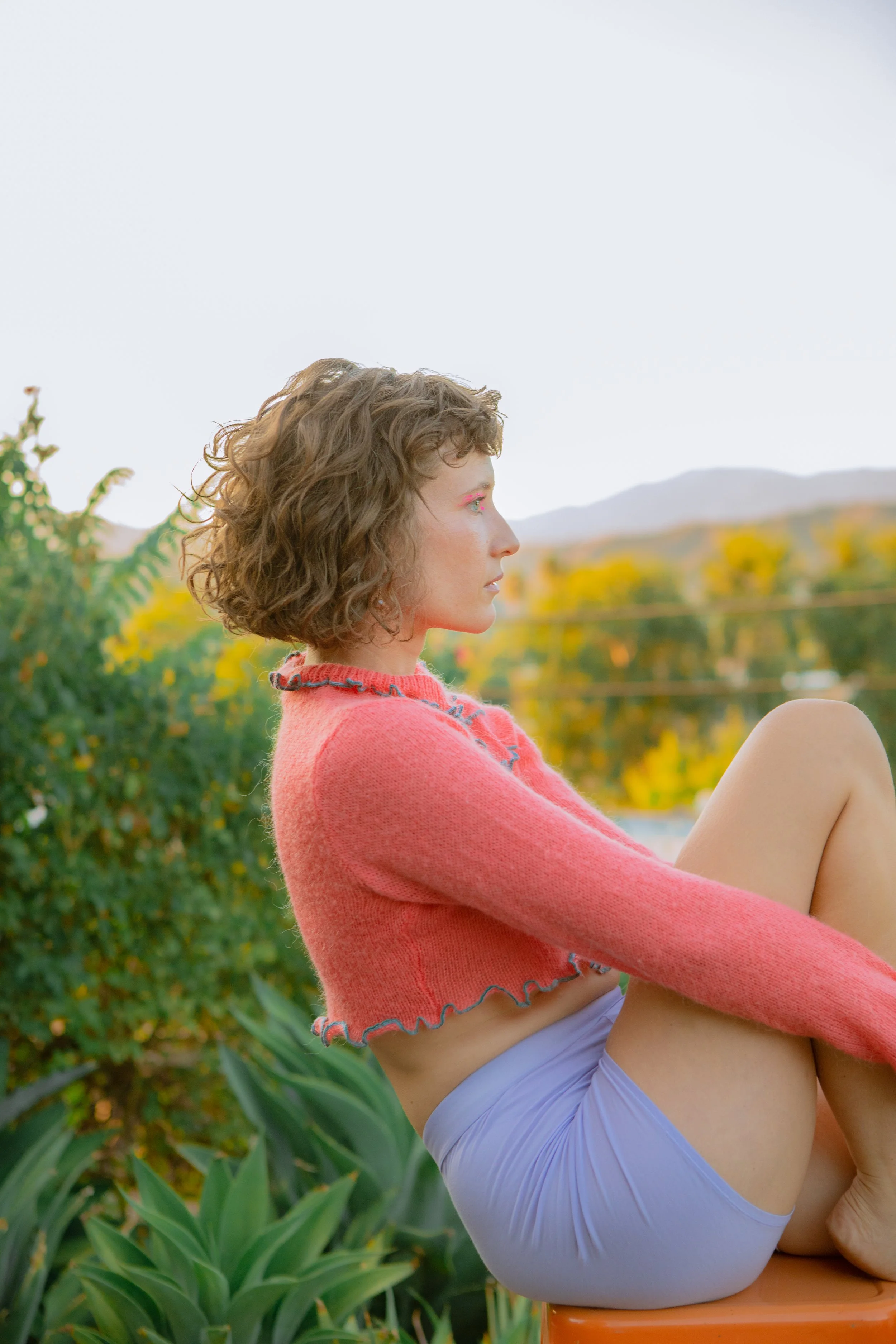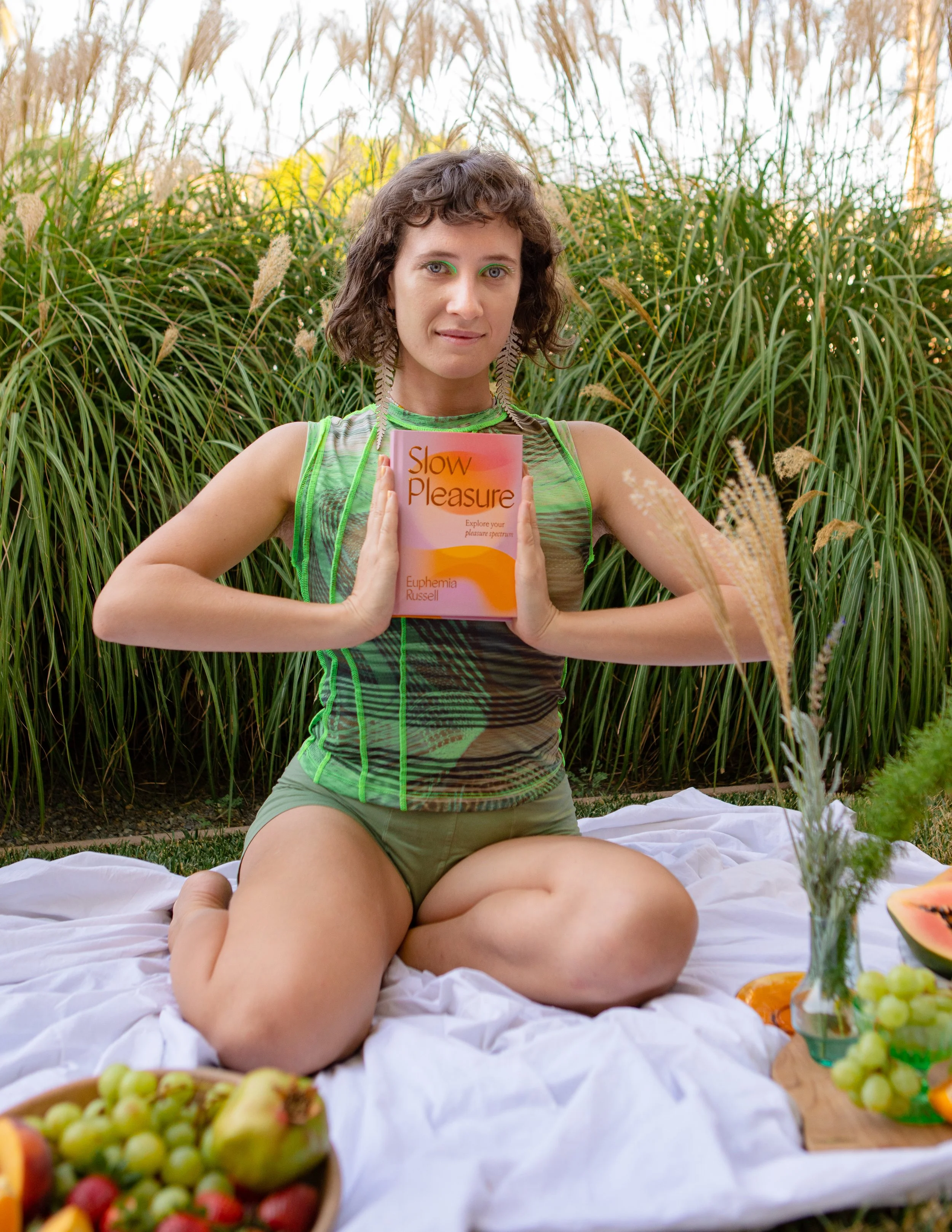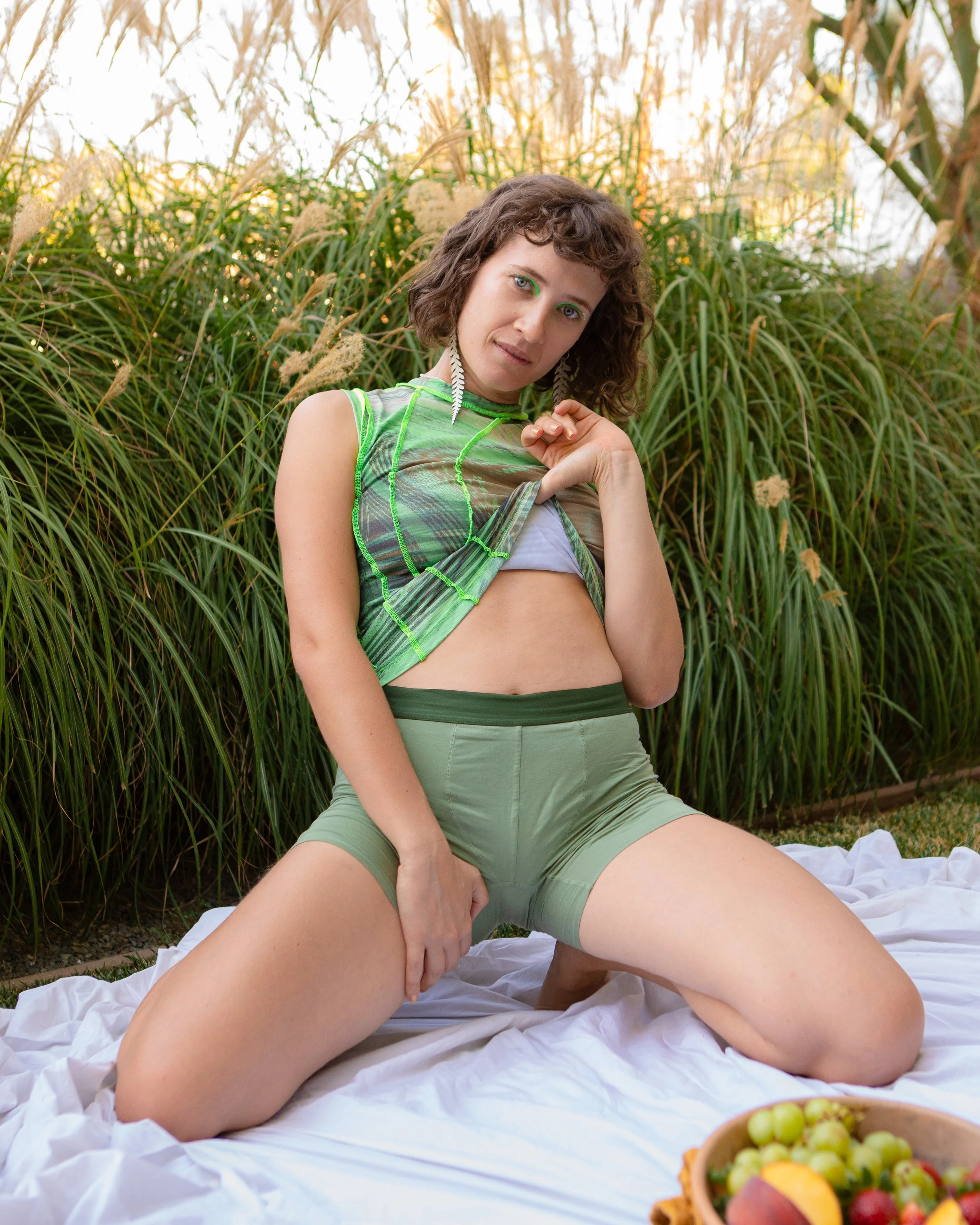New Hero: Euphemia Russell
Euphemia Russell laughs in an up-close photo while sitting against blades of grass. They are wearing a predominantly green outfit. Image credits belong to Ariana Dixon.
AURORE sat down with Euphemia Russell to discuss the inspiration behind their exploration of the pleasure spectrum, their bestselling book, and their rituals for enjoying a pleasure-filled life.
What inspired you to begin exploring the pleasure spectrum?
I began as a sexual pleasure focused educator and coach, and then realized that sexual pleasure is the backdoor into a whole universe of pleasure, and this constellation was accessible in everyday moment, each moment, in infinite ways.
Euphemia is wearing a pink knit sweater and lilac-colored shorts. They have on pink eye makeup and stare off into the distance, sitting down and facing the right side of the screen. Image credits belong to Ariana Dixon.
How do you believe your identity informs your approach to pleasure coaching?
I identify as queer, non-binary and non-monogamous, and polyintimate. So my approach to pleasure is also inherently non-binary. I hold space for clients to explore the spectrum of choices for pleasure, relationships, identity, gender, and choices.
Who is your bestselling book Slow Pleasure written for? Do you believe it’s reached its target audience?
For me, I don’t focus on target audiences and marketing methodologies, I wrote the book and do my work to reach the people who have experiences I want to support.
In essence, I hope that it supports people who have abandoned their pleasure because of being socialised in shame and guilt.
People who wish to remember their pleasure, and are tending to it like a seedling or sapling, budding and growing.
Slow Pleasure: Explore Your Pleasure Spectrum is filled with pleasure practices and reflection questions, so it’s like a written workshop at your own pace in your own space.
Euphemia Russell holds a copy of their book Slow Pleasure: Explore Your Pleasure Spectrum while sitting amongst fruit in front of blades of grass. They wear a predominantly green outfit and stare at the camera with a smile. Image credits belong to Ariana Dixon.
How can marginalized communities discover pleasure in a world that predominantly centers white and heteronormative sensuality?
I have a lot to say about this, as I have witnessed the pleasure space be commodified and colonized as an emerging industry particularly in the last 3 years. It’s marketing pleasure with big business money, through a very White straight women’s feminist marketing lens, and positioned to target White straight couples with “this one tip” and “the sex toy to save your relationship” and this is deeply worrying.
Pleasure work in essence is activism, and I believe that for any pleasure focused professional it is our responsibility to be actively decolonizing ourselves and our work, and expanding the possibilities for access.
As a White person, I am also learning from lineages of somatics and embodiment and animism (I integrate all these with pleasure) that are practices from Indigenous and cultures that aren’t my ancestral homes.
So in essence, I hope to yield, uplift other identities that aren’t my own, listen, and have my own remembering of what it is to be a nourishing connection with myself, my body, others, the land, and all beings.
Where do we begin the conversation on the intersection of trauma healing and pleasure?
In an oversimplified way:
Trauma disconnects us.
Pleasure creates nourishing connection and reconnection,
So showing people that they can experience trauma and pleasure at the same time, it’s not an all or nothing/zero sum equation. It can be bit by bit that we heal, and reconnect, and healing can be fun and pleasurable!
Where do you think we can find sensuality, rest and pleasure in a capitalist world that demands so much of our bodies?
In the small moments, the pauses, the everyday moments. Don’t need to be grand, or even obvious to anyone but yourself. A microadjustment, a mini nap, making space for nourishing connection even for a breath.
From your perspective, how did the pandemic alter how people approach pleasure?
Realizing that being with themselves was challenging, with a lack of distraction and going slow.
The sex tech industry exploded in this time, I believe because of people learning how to navigate sex safely, and how to be with themselves.
How does basking in our sensuality and pleasure aid us in collective care?
Read the last chapter of my book! I talk about the importance of creating a pleasure-based world for the sake of our collective mutual flourishing.
Euphemia Russell wears a predominantly green outfit and sits on their knees among blades of grass. They are positioned on top of a white blanket and lift their shirt up to reveal their stomach. They are looking into the camera with a slight smirk. Image credits belong to Ariana Dixon.
What are your daily rituals for a pleasure-filled life?
Currently, my everyday daily practices are:
My somatic practices (which are intimately mine to share)
Moisturizing my body and scanning my body with my hands for how it wants to be touched, felt, held, understood.
Intuitive free movement
Journaling about my pleasure and connection to self and the world around me each day
FIND EUPHEMIA ON INSTAGRAM
AURORE publishes real erotic stories about our best sexual encounters.
Become a member to access over 300 sexy stories for endless inspiration and titillation. You can browse through our free teasers here to get a taste of what’s to come.



